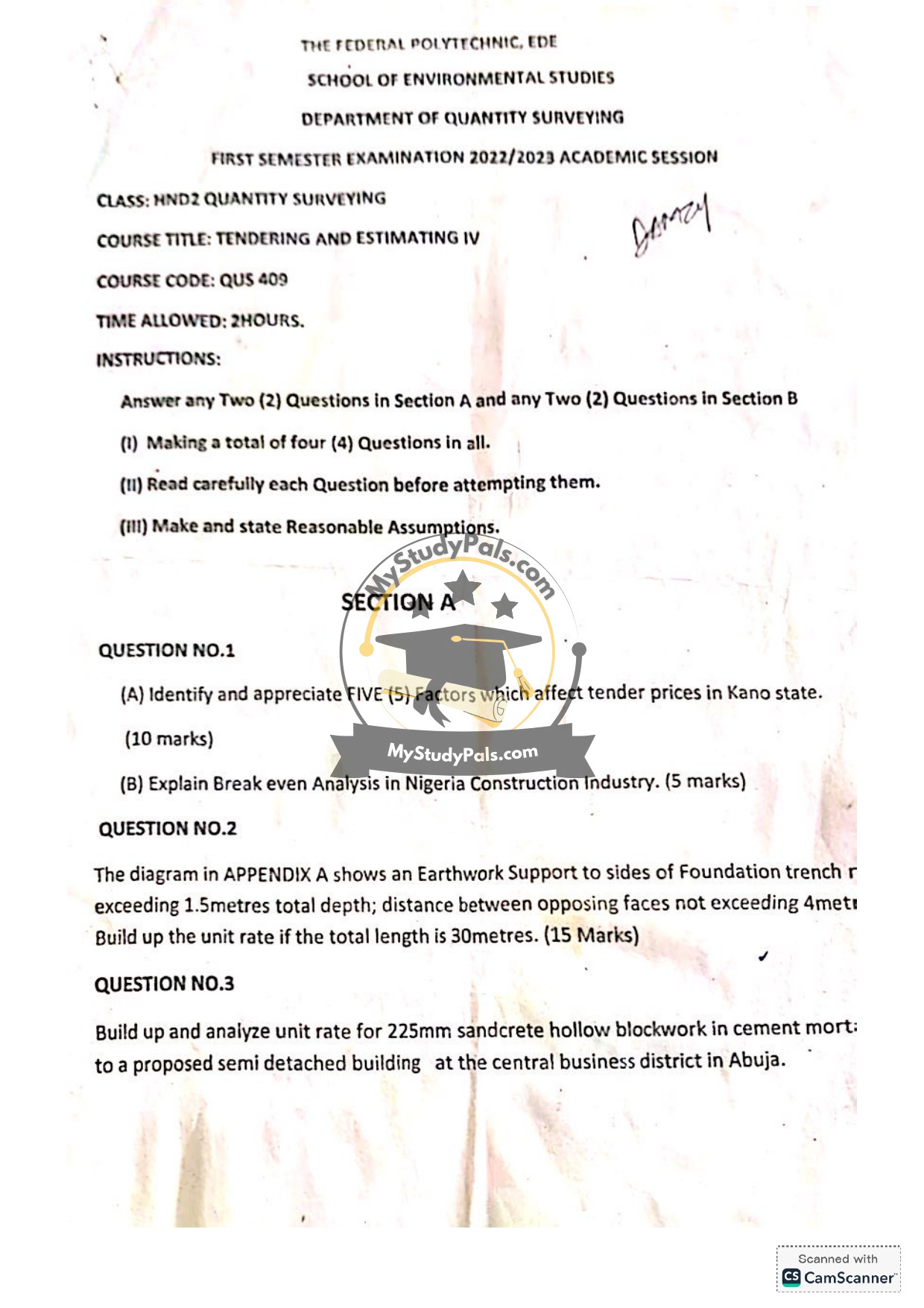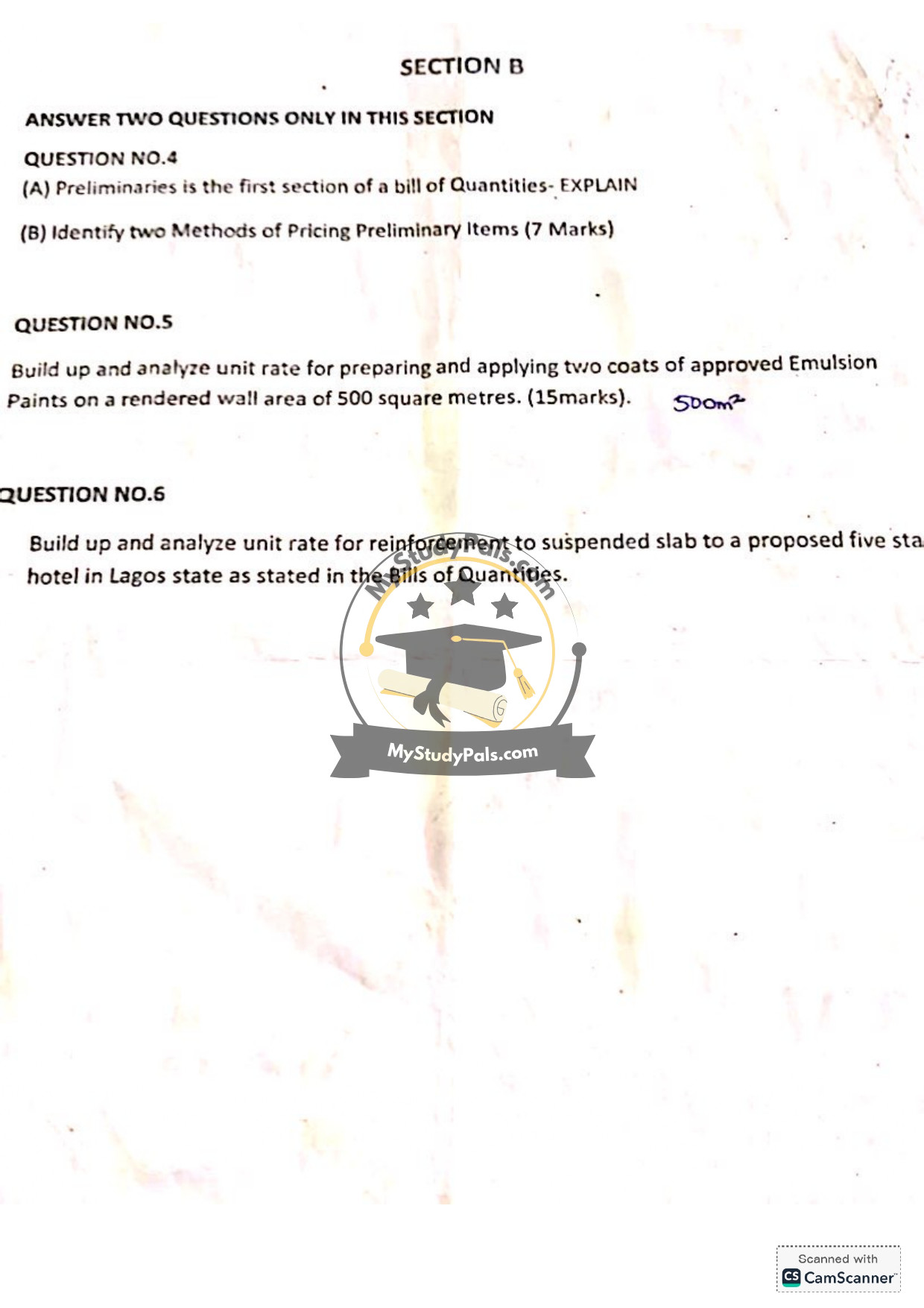ANWSER
Question 1 (A):
Answer:
Five factors affecting tender prices in Kano State are:
1. Material Costs: Fluctuations in prices of construction materials (e.g., cement, sandcrete blocks) due to supply chain challenges.
2. Labor Availability and Wages: Seasonal labor shortages or higher wage demands in urban areas like Kano.
3. Transportation Costs: Distance from material suppliers to construction sites, especially for imported materials.
4. Market Competition: Number of contractors bidding, which can drive prices up or down.
5. Regulatory Requirements: Compliance with local government regulations, taxes, or permits adding to project costs.
—
Question 1 (B):
Answer:
Break-even analysis in Nigeria’s construction industry identifies the point where total revenue equals total costs (no profit or loss). It helps contractors determine the minimum project volume or pricing required to cover fixed costs (e.g., equipment, salaries) and variable costs (e.g., materials, labor). In Nigeria, this is critical due to volatile material prices and unpredictable labor productivity. For example, a contractor might calculate how many housing units must be sold or constructed to offset costs in a real estate project.
—
Question 2:
Answer:
Assumptions:
– Timber trench support system used.
– Labor rate: ₦3,500/day.
– Material costs: Timber planks = ₦12,000/m³, Props = ₦8,000 each.
– Equipment: 1-day hire cost for tools = ₦15,000.
Unit Rate Calculation (per meter):
1. Material Cost:
– Timber required per meter: 0.05m³ (₦12,000/m³ × 0.05 = ₦600).
– Props: 2 props per meter (₦8,000 × 2 = ₦16,000).
Total material = ₦16,600.
2. Labor Cost:
– 2 laborers for 1 day (₦3,500 × 2 = ₦7,000).
3. Equipment:
– ₦15,000 ÷ 30m = ₦500/m.
Total Unit Rate = ₦16,600 + ₦7,000 + ₦500 = ₦24,100/m.
—
Question 3:
Answer:
Assumptions:
– Block cost: ₦250 per 225mm hollow sandcrete block.
– Mortar mix: 1:4 (cement: sand).
– Labor: ₦4,000/day.
Unit Rate (per m²):
1. Blocks: 10 blocks/m² (₦250 × 10 = ₦2,500).
2. Mortar: 0.03m³/m² (Cement: 6 bags × ₦4,000 = ₦24,000; Sand: 0.25m³ × ₦15,000 = ₦3,750). Total mortar cost/m² = ₦27,750 ÷ 100m² = ₦277.5/m².
3. Labor: 0.5 days/m² (₦4,000 × 0.5 = ₦2,000).
4. Waste (10%): ₦(2,500 + 277.5) × 10% = ₦277.75.
Total Unit Rate = ₦2,500 + ₦277.5 + ₦2,000 + ₦277.75 ≈ ₦5,055/m².
—
Question 4 (A):
Answer:
Preliminaries in a Bill of Quantities (BOQ) include costs for general project requirements not tied to specific work sections. Examples: site setup, temporary utilities, project management fees, insurances, and safety measures. They ensure the project is executed smoothly and comply with contractual obligations.
Question 4 (B):
Answer:
Two methods of pricing preliminaries:
1. Lump Sum: A fixed amount based on project scope (e.g., ₦5 million for site offices and security).
2. Time-Related Costs: Priced per week/month (e.g., ₦200,000/month for site supervision).
—
Question 5:
Answer:
Assumptions:
– Emulsion paint coverage: 10m²/liter/coat.
– Paint cost: ₦2,500/liter.
– Labor: ₦1,500/day.
Unit Rate (per m²):
1. Material:
– 2 coats require 0.2 liters/m² (500m² × 0.2 = 100 liters).
– Paint cost: 100L × ₦2,500 = ₦250,000 ÷ 500m² = ₦500/m².
2. Labor:
– 2 laborers for 5 days (₦1,500 × 2 × 5 = ₦15,000).
– Labor/m² = ₦15,000 ÷ 500 = ₦30/m².
3. Equipment/Overheads: ₦50/m².
Total Unit Rate = ₦500 + ₦30 + ₦50 = ₦580/m².
—
Question 6:
Answer:
Assumptions:
– Reinforcement rate: 120kg/m³.
– Steel cost: ₦4,500/kg.
– Labor: ₦3,000/day.
Unit Rate (per kg):
1. Material:
– Steel bars: 120kg × ₦4,500 = ₦540,000/m³.
– Binding wire: ₦10,000/m³.
2. Labor:
– 4 laborers for 3 days (₦3,000 × 4 × 3 = ₦36,000/m³).
3. Waste (5%): ₦(540,000 + 10,000) × 5% = ₦27,500.
Total Cost/m³ = ₦540,000 + ₦10,000 + ₦36,000 + ₦27,500 = ₦613,500/m³.
Unit Rate/kg = ₦613,500 ÷ 120kg ≈ ₦5,112.5/kg.



